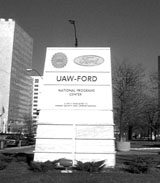The University Record, October 11, 1999 Editor’s Note: This article is one in a series on U-M projects that have been recognized by the Computerworld Smithsonian Program.
By Theresa Maddix

The University has long provided distance learning opportunities for its students, especially through programs at the U-M-Dearborn. But the university’s involvement in the UAW-Ford University project stands apart as a new venture in working with non-traditional students in a non-traditional setting. Students are UAW-represented Ford workers and courses are held using two-way video conferencing in classrooms at Ford plants or using the Internet and CD-ROMs at the plant or at home.
The project grew out of a decade-long School of Social Work program that provided educational counseling to UAW members in Ford plants. When the 1996 United Auto Workers (UAW)-Ford collective bargaining agreement called for “a new program dedicated to a university-style approach to workplace education and training,” the School of Social Work, the Institute for Labor and Industrial Relations (ILIR), and U-M-Dearborn’s College of Arts, Sciences, and Letters (CASL) responded with the “Work, Technology and Society Program.”
The collaboration worked with the UAW-Ford National Programs Center and local UAW and Ford leaders to develop a plant-based educational infrastructure to support distance learning. CASL designed customized bachelor’s degrees addressing the theme “work, technology and society,” specifically oriented to the auto industry.
Not all of the program’s students are pursuing a bachelor’s degree. Many plan to transfer the credits to other degree programs or see the courses as enrichment opportunities.
Bruce Pietrykowski, assistant dean of Dearborn’s College of Arts, Sciences, and Letters and associate professor of economics, directs the degree program from the Dearborn campus. He sees it as “a new way of learning, guided by a strong commitment to academic excellence in the classroom that has been the hallmark of U-M-Dearborn faculty.” Specialized classes, all taught by Dearborn faculty members, such as “Labor and Literature,” “Economics of Fordism and Post-Fordism” and “Organizational/Industrial Psychology” support Pietrykowski’s assessment.
Education resource specialists, under the direction of Justine Bykowski, are key to the program’s success. They work at the University and in the plants, advising students, helping to obtain resources and explaining the academic and technical challenges of distance learning. They also provide a communication link between plant-based learning centers and education training coordinators.
Kae Halonen, one of the education resource specialists, notes, “the program is a challenging one.” A person obtaining a University of Michigan degree can be assured that “standards have been maintained. The U-M has a very high standard in terms of expectations around what students can do, what they should do and what they can be,” she states.
While not compromising the course content or quality, the program recognizes that the students have needs that differ from those of many of the students sitting in classrooms at U-M-Dearborn or in Ann Arbor. Many workers have more specialized computer experience and are not as likely to be comfortable with personal computers. Most of the students have been out of a classroom setting for years. The responsibilities of family and holding a full-time job can interfere with study.
The education resource specialists of the School of Social Work and the technical support team at ILIR are integral to the success of the program.
Program director Larry Root has been with the project since its inception. Root, professor of social work and director of ILIR, says, “Building on-site educational resources and creating an infrastructure to support distance learning has been a major challenge. We are extremely fortunate to have terrific student support and a top-notch technical team.”
A technical support team helps students learn how to access the Web from home, set up and use e-mail accounts, use basic word processing programs and move between programs. They also keep the video-conferencing and course Web pages working and up-to-date.
Student feedback on the pilot program has been very encouraging: “Had it not been for the flexibility the University distance learning program affords me, I would probably never have returned to college,” said Robert Borders of the Louisville Ford Plant and UAW Local 862.
Adib Ahwal of the UAW Local 182 at the Livonia Ford Plant said, “The workplace is increasingly requiring some knowledge of the computer, and this program is an excellent opportunity to gain basic computer skills.”
Now in 10 plants, Root hopes that UAW-Ford University classes eventually will be offered throughout the UAW-Ford system.
UAW-Ford University is one of 14 U-M projects that recently received a Computerworld Smithsonian Award. The projects now are part of the Smithsonian Institution’s Permanent Research Collection on Information Technology and are part of a permanent exhibition that opened in spring 1990 at the Smithsonian’s National Museum of American History on the history of information technology.

